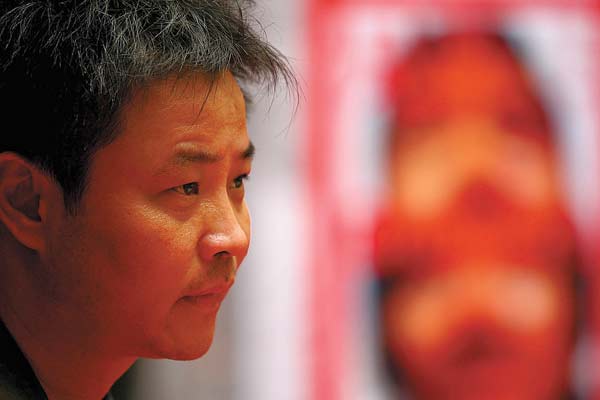 Russian navy ships make peace visit to Cuba
Russian navy ships make peace visit to Cuba
 Hong Kong Airlines stewardesses learn Wing Chun kung fu
Hong Kong Airlines stewardesses learn Wing Chun kung fu
 Old town Dali hosts int'l photography exhibition
Old town Dali hosts int'l photography exhibition
 Death toll rises to 29 in rain-related accidents across Pakistan
Death toll rises to 29 in rain-related accidents across Pakistan
 Chinese police rescue baby allegedly sold by doctor
Chinese police rescue baby allegedly sold by doctor
 Nutrica recalls Karicare infant formula in New Zealand
Nutrica recalls Karicare infant formula in New Zealand
 Sexy models in CFGP race
Sexy models in CFGP race
 Child labor still remains rampant in war-hit Afghanistan
Child labor still remains rampant in war-hit Afghanistan
 Sun Yang the star of last day at World Swimming Championships
Sun Yang the star of last day at World Swimming Championships
 |
| Author Yu Hua is prepared for criticism of his latest novel The Seventh Day and says he will not look at reviews until the comments become rational. (Provided to china daily) |
Yu Hua's latest novel has attracted criticism since its release, but the author defends his work about lost spirits, claiming it deals with the realities of the modern world.
Author Yu Hua's latest novel The Seventh Day has attracted criticism since its release in June. Many readers have declared it Yu's worst novel, eight years after they claimed one of Yu's most influential works, Brothers, was the worst of its genre. But the author has defended his latest book, calling it his "closest contact with reality". He has also dubbed it "the most representative" of his overall writing style. Yu says the book is a manifestation of all the elements ever featured in his fiction from the 1980s to today.
The Seventh Day, an absurdist work inspired by Genesis, is a tale of many deaths. The narrative revolves around different spirits' experiences and memories in the first seven days after their death, caused by the type of events which have recently aroused controversy in China.
A couple are killed when a house is forcibly demolished. Unsettled spirits from an accidental fire wander around confused. Their deaths have been covered up by the government and their bodies kept away from their families.
Beijing News critic Zhang Dinghao wrote that compared with Brothers, which dealt with a changing society over the course of decades, Yu's latest retelling of recent and widely known social events offers no more insight than reposting a comment on micro blog weibo.
Not to mention the language is outmoded and plain, Zhang adds.
"People can hardly believe it's the result of seven years of work. It's more like Internet fast food, rushed in a couple of days," Zhang writes.
Zhang, like many others, deems Yu's latest work an example of readership positioning the author is trying to appeal to foreigners, given his growing influence overseas after publishing books in more than 20 countries.
Translation will cover and may even improve the rough language that Chinese readers may find uninspiring, Zhang notes, and the social events local readers may find dated will "put on a super-realistic magic coat" overseas.
Technical problems aside, Yu's recollection of social events, in the opinion of critics, are fragmentary and superficial in the first place.
Renmin University's literature professor Yang Qingxiang writes in Beijing News that in a time when everyone is a storyteller on weibo, a good novelist must distinguish himself by writing complex works.
In this instance, Yu has only scratched the surface of the stories and characters, Yang adds.
"The novel lacks a spiritual link. It's not like a novel but rather a simple collection of unrelated short stories. The characters are flat. All of them are like unimportant passers-by, unable to connect with your heart," he writes.
Prepared for criticism, Yu says he will not look at reviews until the talk about the book cools and comments become rational.
Still, in a press release from the publishing team, Yu briefly defended himself, saying he didn't have to copy the daily news cycle because these issues have existed long enough to become part of our lives.
"It's best for me to present these absurd things all at once. I won't focus on one event like I did with Chronicle of A Blood Merchant. In that book, blood selling appears for only four times. I mainly write about their lives, which is what interests me. Blood selling is only a pretext," he says.
 |
 Tough training of PLA special forces
Tough training of PLA special forces  Pakistan's rain-triggered accidents claim 29 lives: media
Pakistan's rain-triggered accidents claim 29 lives: media Strong tropical storm Jebi leaves Hainan
Strong tropical storm Jebi leaves Hainan Top 10 most dangerous jobs in the world
Top 10 most dangerous jobs in the world Yi people celebrate torch festival with songs and dances
Yi people celebrate torch festival with songs and dances  Sun Yang wins 3rd gold of World Championship
Sun Yang wins 3rd gold of World ChampionshipDay|Week|Month